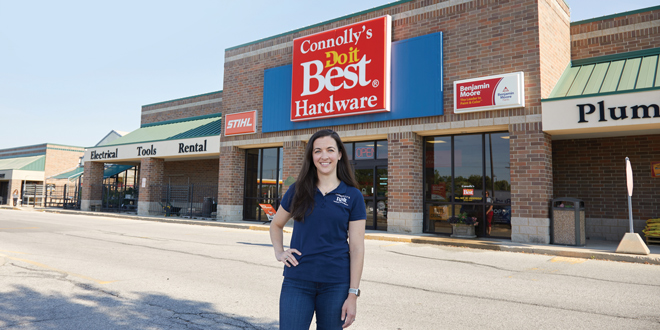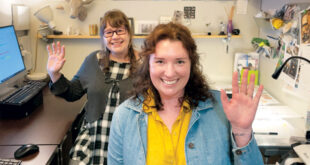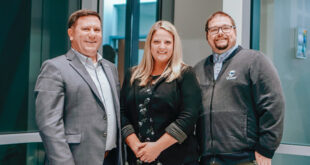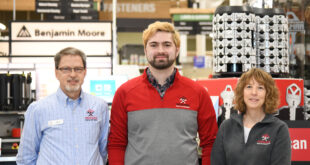Last month, Hardware Retailing explored how two retailers shifted their operations to keep customers and employees safe during the first months of COVID-19’s retail impact. From establishing new workflows to leaning into digital communication, Connolly’s Do it Best in Fort Wayne, Indiana, and Costello’s Ace Hardware in Maryland, New Jersey and New York, have modified their approaches to meeting customers’ shopping needs and preferences during the pandemic.
This month, learn what changes will endure for these two operations and what the teams will remember from this period of retail history. Plus, get snapshots of how other retailers across North America adapted their businesses in the time of COVID-19.
Retailer COVID-19 Response: Pioneer Home Hardware
Improving Team Collaboration
Ongoing collaboration with staff has helped create a strong team environment at Pioneer Home Hardware Building Centre in Campbell River, British Columbia, but navigating a pandemic has made sharpened communication skills necessary.
“We had to make a lot of adjustments to the way we did things on the spot, and that meant we had to be there,” co-owner Theresa Handel says. “We were rolling up our sleeves and helping out in ways we may not normally have needed to help out. Collaborating with our staff was a huge part of what we did every day. They would often see an issue arising before we did and have ideas how to fix it.”
Customer Service Under Threat
As the way companies do business has changed due to COVID-19, Connolly’s Do it Best communications manager Lauren Mathews and the rest of the Connolly’s team worried customer service might slip in their four stores as employees and customers maintained social distancing and limited contact.
“Our mission is to provide each customer with prompt, friendly and knowledgeable service. I think the biggest risk in changing our operations was that we might stray from that mission, even if we didn’t mean to,” Mathews says.
The Connolly’s Do it Best team was already operating with fewer members as some employees decided to stay home to reduce their risk of exposure to the virus. As the employee count temporarily dwindled, customer counts rose when the business was declared an essential operation in Indiana and was permitted to continue operating. Mathews says throughout the early days of COVID-19 disruption, customers were sympathetic and patient.
“We’re three or four times as busy as normal now. COVID-19 hit at the start of the spring selling season, and we had staff staying at home and employees in the store had to maintain social distance in everything we did,” Mathews says.
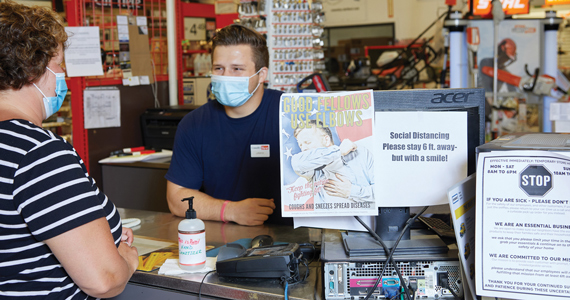
“It was a challenge to live up to that mission. We may have fallen short a few times, but we learned from those issues and got to improve.”
Customer service may have temporarily destabilized at the 32 Costello’s Ace Hardware stores because employees had to help far more customers than usual, CEO and owner Michael Costello says. The company aimed to serve as many people as possible versus maintaining the stellar service for a smaller number.
In addition, customer demand for online and phone orders, as well as socially distanced curbside pickup and home delivery skyrocketed, taxing the team in unprecedented ways.
“This situation was particularly challenging because our people were already dealing with fatigue from serving more customers, added cleanliness requirements, personal fears and less staff,” Costello says. “We were asking a lot of them to do their usual jobs and it was asking even more to have them execute operational changes.”
Retailer COVID-19 Response: Pioneer Home Hardware
Customers Still Prefer the In-Store Experience
When Clark Devon Hardware in Chicago started offering curbside service, only a few customers used it, says floor manager Jay Fuentes. About 15 or 20 customers a day were using the service at its peak, and usage quickly dwindled when the stay-at-home restrictions eased. At the same time, online sales quadrupled, with many customers visiting the store in person to pick up their orders.
“When someone submits an internet order, we always suggest that they leave their phone number,” says Fuentes. “We often need to have a follow-up call. Homeowner traffic has picked up during the pandemic, and they usually need extra help as you walk them through their project and talk about their options.”
Safety measures like installing spit guards, offering hand sanitizers and disinfecting the store, have given customers the confidence they need to return to Clark Devon. While he’ll continue to offer the option for curbside delivery, Fuentes thinks the demand will be low enough it will be manageable as customers seem to prefer making an in-person visit to the store.
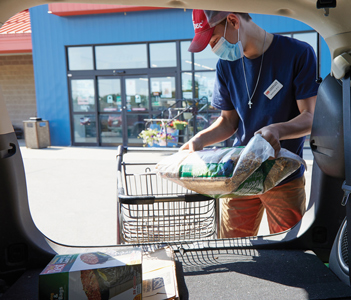
What It Takes to Deliver
Building up the delivery fleet at Costello’s Ace Hardware was an important investment—a sign of the direction the Costello’s team believes business is headed in order to stay competitive. The company hired staff, bought three new delivery vans and mapped out 10 additional delivery routes.
“When we decided to set up new delivery routes and add drivers, we had to consider how things were going to look after COVID,” says Rob Feiler, executive vice president of sales and marketing. “You always want to set yourself up for a scale that’s sustainable.”
They had seen increased demand for delivery and growth in their online business prior to the pandemic, but self-quarantining customers wanted to make phone and online orders and get contactless delivery for a vast array of products.
People shifted from desperately shopping for masks and cleaning supplies to settling in at their homes and starting small DIY renovations that could have a big impact on their new ways of life. They bought what they needed to stay comfortable and productive during the pandemic, and Costello’s delivered play sand, hundreds of bags of mulch, paint and grills to help those projects take root and deliver a monumental year for home improvement retail sales.
“How we put our mission statement into action may have changed, but the core goals of customer service never did.” —Lauren Mathews, Connolly’s Do it Best
Costello’s drivers rang doorbells, stepped away from the doors to keep comfortable distances and offered to place the products where customers needed them— even putting bags of mulch throughout a person’s yard in places where the customer would later spread the product. Customers will expect that kind of service going forward, even when COVID-19 is no longer an immediate threat, Feiler says.
“We did not want to grow delivery too much because we didn’t know if demand would back off a little,” Costello says. “But the other thing we were thinking is this is the future of our business. We’re really trying to build a business that serves customers in a better way and in a way they’re going to expect in the future.”
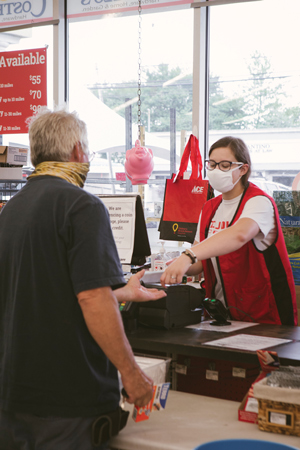
Maintaining the Mission
Mathews says Connolly’s Do it Best has revised almost every part of its business model since the arrival of COVID-19. As the team perfects its new processes and refines its curbside pickup protocol, she says one thing that will never shift is the team’s constant commitment to the business’s mission statement.
“Our goal has always been to offer customers fast, friendly, knowledgeable service,” she says. “COVID-19 changed what customer service looks like, but it will never change how we do business.”
Mathews says the past eight months of operating during the pandemic—though at times chaotic, stressful and uncertain—have helped Connolly’s Do it Best solidify what is truly essential to customer service.
“How we put our mission statement into action may have changed, but the core goals of customer service never did,” she says.
Retailer COVID-19 Response: Pioneer Home Hardware
Free Delivery for Household Items
Typically, deliveries coming out of Pioneer Home Hardware are large items, such as grills, lumber or lawn mowers. But when her local province started encouraging people to stay home if they could, Handel made some changes to their delivery policy to allow for delivery of household items.
While the change in policy was only meant to be temporary and help customers who shouldn’t be leaving their homes during the pandemic, Handel says the experience could possibly lead to more long-term changes.
“Our delivery service, as well as our curbside pickup, has really helped us reach out to a specific group of customers,” co-owner Theresa Handel says. “Most of them were elderly people who always had someone else doing their shopping for them. Now, they have a newfound freedom of being able to call in their order and have it delivered to them. We are considering keeping those options available in the future.”
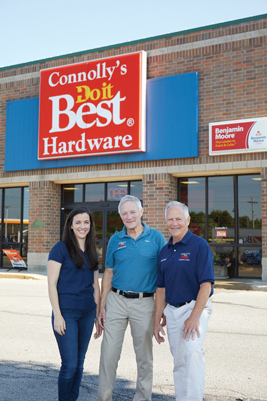
employees and customers,
while still allowing for personal
connections. Many retailers have
outfitted their checkout areas
with similar safeguards.
Going Forward
The initial months of figuring out how to meet the new order and delivery challenges strained the Costello’s staff. However, the business has improved operations so significantly that Costello thinks few employees would want to return to the old ways they did business. They are also more open to constant adaptation after weathering a whirlwind of changes.
“I think people like where we are at the moment. The stores are busier, but they have bigger staffs now,” Costello says. “It’s the job of leadership to help people see that where we’re going is a lot better than where we are now.”
Taking phone orders and maintaining relationships with customers who prefer phone ordering are part of the plans, too. Stores now have employees who are dedicated to taking phone orders. Costello’s may add a call center not only to meet that ongoing need, but also to reach out to existing customers.
“Customers usually need to talk through a problem and it requires a certain amount of care and expertise to help them,” Costello says. “We see an opportunity to not just have customers reach out to us, but for us to reach out to them and be proactive.”
Maintaining a delivery fleet is a key part of Costello’s future plans. The management team is considering offering subscription services for customers who may want HVAC filters delivered quarterly or birdseed dropped off monthly. The Costello’s team is also considering loading a delivery van with high-demand seasonal products ahead of snowstorms and other weather events, then let customers know when the van will be in their neighborhoods.
“I don’t think we’ll focus any less on our stores,” Costello says. “All customers want to shop different ways at different times for different things. The more we meet their needs, the more important we will be to them.”
Connolly’s Do it Best will keep its curbside pickup services. Doing so is a simple way to ensure customers receive individualized service when they choose the business, Mathews says.
“We’re definitely going to continue curbside pickup,” she says. “I don’t know that we would advertise it as heavily, but we would always keep it in some capacity.”
Mathews says even though the past few months have been trying, they have also served as a reminder of the basic values of Connolly’s Do it Best.
“I think looking back on this time, I’m going to remember the hustle of it all,” she says. “We were working on a massive store reset, but every one hustled to make sure customers got what they needed.”
Buy-in from employees at all levels made the past few months a success, and Mathews is proud of the employees for shifting their day-to-day tasks without losing sight of their overarching goal.
“We’ve been lucky to be in an essential sector,” she says. “A lot of the changes we’re seeing are things that were happening already, but happened more quickly because of COVID-19.”
Retailer COVID-19 Response: Dalton Lumber Do it Center
Curbside Service Sharpens Product Knowledge
Learning to communicate with customers when they’re not standing beside you in the store adds to the challenge of offering curbside service, says Scott LaCoe, who along with his father, Doug, own and operate Dalton Lumber Do it Center in Dalton, Pennsylvania.
For about a month this spring, Dalton Lumber closed the doors to customers and offered curbside delivery only. The temporary closure gave the LaCoes a chance to figure out how they could safely reopen the store. They encouraged customers to send their orders any way they could—email, phone, text, Facebook messenger—but most orders came in by phone.
“We thought business would slow down a little bit during that time. Instead we were constantly running around answering phones and filling orders,” says LaCoe. “Our employees have always been very good with customers, but doing curbside required a whole new level of service.”
“When that conversation happens on the phone, employees have to dig deeper into their product knowledge to describe how something works or what a product looks like.”
Many customers, he says, have a general understanding of what products they need to complete their project. Typically, staff can usually help them find it by showing them different options in the store. But with curbside service, customers can’t bring in their old part and match it up with a new one or just point to what they need when they see it. When that conversation happens on the phone, employees have to dig deeper into their product knowledge to describe how something works or what a product looks like.
“A lot of our employees learned a lot of new things because of that,” LaCoe says. “I think going forward our product knowledge has gotten better.”
 Hardware Retailing The Industry's Source for Insights and Information
Hardware Retailing The Industry's Source for Insights and Information



